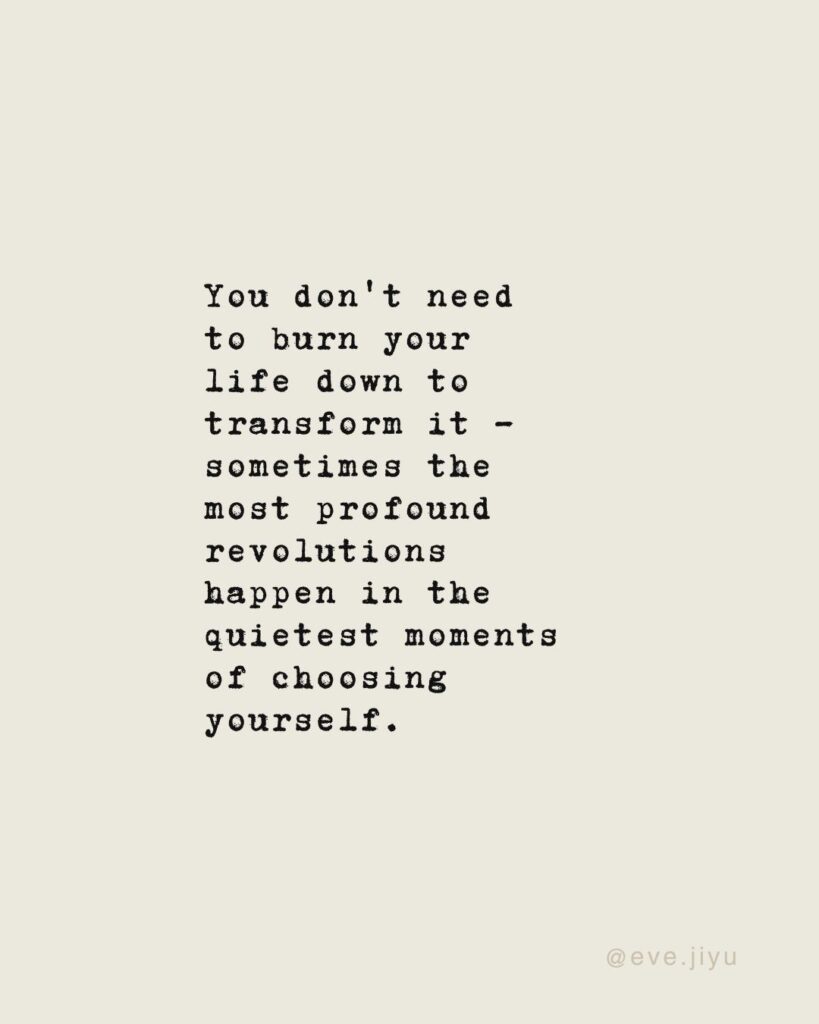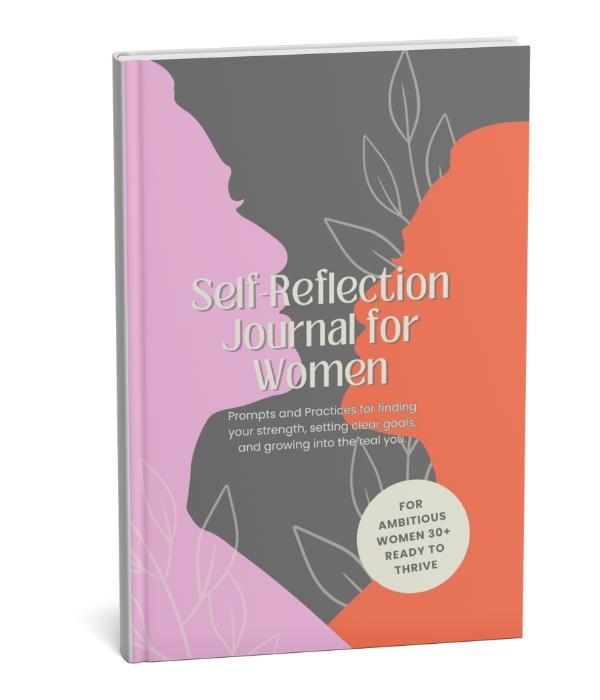Table of Contents
On the eve of my 34th birthday, I was lying in the bathtub, my phone in hand, letting the words pour from my soul. The water was growing cold, but I barely noticed. Something was happening – a release, a revelation, an unburdening I hadn’t expected. My fingers moved across the screen, capturing thoughts that had been locked inside me for years.
I will remember this journaling for self discovery session for the rest of my life. The next morning, I woke transformed – my thoughts crystalline, my purpose clear. What seemed like a simple act of emotional purging had become a portal to profound self-understanding. This wasn’t just journaling; this was therapeutic journaling at its most powerful.
If you’ve ever felt disconnected from your authentic self, overwhelmed by others’ expectations, or trapped in patterns that don’t serve you, this guide will show you how journaling for self discovery can help you find your way back home to yourself.
Why Your Brain Loves When You Write It All Down
What happens in our brains when we practice therapeutic journaling isn’t just psychological – it’s neurological. When we write about our experiences, particularly difficult ones, we activate the brain’s integration process.
Dr. James Pennebaker, psychologist and pioneer in writing therapy research, explains: “Translating experiences into language enables people to make meaning out of difficult situations. This helps them to gain control over their emotions and reduce the negative health effects of stress.”
Studies published in the American Psychological Association journals show that regular expressive writing can lead to:
- Improved working memory and cognitive function
- Reduced rumination and anxiety symptoms
- Enhanced immune system function and faster healing
- Better emotional regulation and stress management
- Increased self-awareness and personal insight
When we engage in journaling for mental health, our brain’s limbic system (emotional center) communicates with the prefrontal cortex (logical reasoning). This cross-talk between brain regions helps integrate fragmented emotional experiences into coherent narratives, turning chaos into meaning.
As neuroscientist Dr. Sarah McKay explains, the popular idea that the left brain is strictly analytical and the right brain is purely creative is a myth. In reality, writing is a whole-brain activity that engages multiple regions across both hemispheres, combining logic, language, memory, and imagination. This integration is what makes writing such a powerful tool for processing emotions and generating insight.
This explains why my bathtub revelation felt so transformative. My brain wasn’t just processing thoughts -it was rewiring itself through the power of expressive writing.

From Pink Diary to Life-Changing Self Discovery Practice
Like many of us, my journey with journaling for self discovery began long before I recognized it as such. As a ten-year-old girl with a pink, heart-shaped, padlocked diary, I wasn’t thinking about neuroplasticity or emotional regulation. I was simply recording my days, preserving moments that somehow felt important.
Twenty years later, those early writings still resonate, like time capsules of my developing self. But my serious therapeutic journaling practice began four years ago, coinciding with my decision to give up alcohol. Nature became my sanctuary, and the page became my confessor.
The resistance was there at first – the whispers that this was just another passing wellness trend, too “woo-woo” to take seriously. I had my doubts:
- “Will I be consistent enough?”
- “What if I have nothing meaningful to write?”
- “Is this just another distraction from real change?”
Perhaps you’re facing similar doubts now. I’ve heard them all in my workshops:
“I don’t have time,” says the overwhelmed mother of two. “I don’t know how to start,” admits the analytical businessman. “I’ve tried it before, and it didn’t help,” sighs the skeptical friend.
To them – to you – I say this: Five minutes. That’s all it takes to begin your journaling for self discovery journey. Five minutes of unfiltered writing can create space in a crowded mind. If you’re too busy, you need this practice more than anyone.
How to Start Your Therapeutic Journaling Practice
Beginning is simpler than you think. Let the thoughts flow – raw, unedited, without judgment. Write as though no one, not even your future self, will read these words. Begin with “I feel…” or “Today I noticed…” and see where the pen takes you.
As for consistency, pair your writing with something you already do daily. For me, it’s morning tea – the ritual of brewing leaves, watching steam rise, and letting words spill onto the page has become sacred.
How Journaling Broke My Cycle of Painful Thoughts
Before therapeutic journaling became my anchor, I lived in a psychological hamster wheel. The same thoughts circled endlessly – childhood wounds, relationship patterns, fears of inadequacy. According to research, a significant portion of our daily thoughts are repetitive, often revolving around similar themes or concerns. We think we’re processing, but we’re just rehashing.
“Neurons that fire together wire together. Mental states become neural traits. Day after day, your mind is building your brain.”
— Rick Hanson, Hardwiring Happiness
This resonates deeply with my experience using journaling for mental health. When thoughts remain unwritten, they grow tentacles, attaching themselves to unrelated situations. My romantic relationships suffered most from this mental chaos. Each disappointment or conflict would trigger an avalanche of old pain.
I remember one particularly difficult breakup. For weeks, I kept asking, “Why me? What’s wrong with me?” But when I finally poured these questions onto paper through expressive writing, something shifted. Seeing my pain externalized, I could examine it with compassion rather than judgment.
The Breakthrough Moment
The breakthrough came when I wrote: “Maybe this isn’t about me being unlovable. Maybe this is about two good people who couldn’t meet each other’s needs.”
That single sentence, emerging from pages of hurt and confusion, changed everything. It wasn’t an immediate healing, but it was a door opening to a new possibility – that my worth wasn’t determined by a failed relationship.
This is the magic of journaling for self discovery: it creates space between experience and interpretation. It allows us to witness our stories rather than being consumed by them.

The Small Rituals That Make Journaling Stick
My mornings begin with ritual. Before emails, before social media, before the world rushes in, I create a pocket of stillness. A steaming cup of peppermint tea on my left, journal open on my right. Sometimes I light palo santo, its earthy scent signaling to my brain: this is sacred time.
In the silence, I begin with three simple prompts for journaling for self discovery:
- How does my body feel today?
- What am I grateful for in this moment?
- What is my intention for the day ahead?
These questions anchor me in present reality rather than past regrets or future anxieties. They form a foundation for everything that follows in my therapeutic journaling practice.
Some days, words flow easily. Other days, I sit with the blank page, noticing resistance, honoring it rather than forcing through it. Even this is valuable – the practice of staying present with discomfort without needing to fix or change it.
The most important question I ask myself daily is: “What small step can I take today?” This simple prompt has guided me through career transitions, healing from loss, and building new relationships. It reminds me that transformation doesn’t happen in grand gestures but in consistent, tiny choices.
When life gets hectic and the journal stays closed for days, I don’t abandon the practice. I jot thoughts in my phone Notes, sometimes mid-walk, mid-tea, mid-overthinking, or simply spend a mindful minute breathing and noting my internal state. The form matters less than the intention – to witness my experience with compassion.
Powerful Journaling Prompts for Healing and Self Discovery
To help you begin or deepen your therapeutic journaling practice, here are journaling prompts for healing that have guided my journey:
For Emotional Clarity and Processing
- What emotion am I experiencing right now, and where do I feel it in my body?
- If this feeling could speak, what would it say?
- What do I need to forgive myself for today?
- How can I show myself compassion in this moment?
For Releasing What No Longer Serves
- What story am I telling myself that keeps me stuck?
- What am I holding onto that I could release?
- If I weren’t afraid, I would…
- What beliefs about myself are ready to be questioned?
For Growth and Self Discovery
- What brought me joy today, however small?
- How did I show up for myself today?
- What wisdom would my future self offer me in this moment?
- Who was I before others’ expectations shaped me?
For Healing Relationships
- What needs remain unmet in this relationship?
- How might this conflict look from the other person’s perspective?
- What patterns from my past am I repeating here?
- How can I communicate my truth with love?
Example from My Personal Practice
Here’s an example from my journal during a particularly challenging career transition:
April 12 – I feel stuck between what’s expected of me and what I truly want. The thought of leaving my job creates a tight knot in my stomach – fear of judgment, fear of failure. But when I imagine staying, there’s this heaviness in my chest, like something inside me is dying slowly.
If I weren’t afraid, I would give myself permission to create work that matters to me, regardless of how it looks to others. The small step I can take today is researching that graphic design course I’ve been considering. Not committing – just exploring. Just opening the door to possibility.
Two months later, I enrolled in that graphic design course. While I don’t regularly use Photoshop or Illustrator today, the skills I gained have become invaluable in creating content and expressing myself visually. The journey wasn’t linear, but that honest journal entry was the first step toward trusting myself enough to make significant life changes.

When Journal Revelations Transform Real Life Decisions
Journaling for self discovery is not just about what happens on the page – it’s about how those insights transform your lived experience.
As author Natalie Goldberg says, “Writing is the act of burning through the fog in your mind.”
As my therapeutic journaling practice deepened, I noticed my decision-making changing. Rather than reacting immediately to challenges, I developed the habit of pausing, reflecting, and responding with intention. When faced with difficult choices, I would ask, “What would the version of me who knows her worth do?”
A Pivotal Moment of Self-Trust
In one particularly pivotal moment, I was offered a project that promised financial security but conflicted with my values. Before developing my journaling for mental health practice, I would have accepted out of fear, then resented my choice. Instead, I wrote through my options, exploring not just practical considerations but how each path aligned with my deeper truth.
The clarity that emerged surprised me. I declined the project with grace and confidence. Within weeks, an opportunity that honored both my financial needs and my values appeared – as if the universe was confirming my self-trust.
This is perhaps the greatest gift of expressive writing therapy: it teaches you to trust yourself. When you regularly witness your thoughts without judgment, you develop an inner compass that guides you home to yourself again and again.
Journaling has shown me that I am emotionally mature, capable of making decisions aligned with my values. Looking back at old entries, I see my growth mapped in ink – how situations that once devastated me now barely register, how patterns I once thought permanent have dissolved through awareness.
The Science Behind Journaling Benefits
Research consistently supports the transformative power of therapeutic journaling. According to studies published in Psychosomatic Medicine, expressive writing can:
- Reduce symptoms of depression and anxiety by up to 25%
- Improve immune function and reduce inflammation
- Lower blood pressure and improve cardiovascular health
- Enhance sleep quality and reduce insomnia
- Increase overall life satisfaction and well-being
Dr. Pennebaker’s landmark research shows that people who practice expressive writing for just 15-20 minutes daily for four consecutive days show measurable improvements in physical and mental health that last for months.
The key is consistency and emotional honesty. The benefits of journaling compound over time, creating lasting changes in how we process emotions, make decisions, and relate to ourselves and others.
Your Journey to Self Discovery Starts Now
Journaling for self discovery has shown me that I am emotionally mature, capable of making decisions aligned with my values. Looking back at old entries, I see my growth mapped in ink – how situations that once devastated me now barely register, how patterns I once thought permanent have dissolved through awareness.
As Hayley Phelan of The New York Times called journaling “essentially a panacea for modern life,” my experience confirms this seemingly hyperbolic claim. When we’re bombarded with external voices telling us who to be and what to want, therapeutic journaling calls us back to our own truth.
I would never go back to the person I was before – someone who felt small, who sought validation externally, who didn’t trust her own knowing. Journaling for self discovery didn’t just change what I do; it transformed who I am.

Start Your Transformative Practice Today
Your journey begins with a single sentence. One honest admission. One question you’ve been afraid to ask. The page can hold it all – your doubts, your dreams, your darkest thoughts, your brightest possibilities.
Start today. Five minutes. Pen meets paper.
Try this simple beginning:
- Set a timer for 5 minutes
- Write “I feel…” and continue without stopping
- Don’t worry about grammar, spelling, or making sense
- Let your thoughts flow freely onto the page
- When the timer ends, take three deep breaths
Know that in those minutes, neurons are firing, patterns are shifting, and somewhere beneath the surface of awareness, you are coming home to yourself through the power of journaling for self discovery.
The blank page is waiting. What will you discover there?
“We write to taste life twice, in the moment and in retrospect.” – Anaïs Nin
“Writing is thinking. To write well is to think clearly. That’s why it’s so hard.” – David McCullough














0 Comments